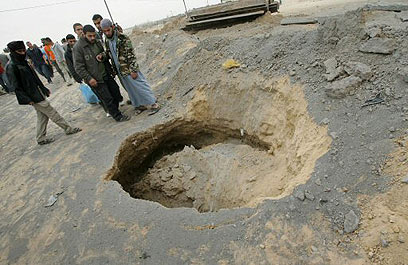

IDF airstrikes in Gaza over the weekend "send a clear message to terror organizations in the Gaza Strip that Israel will respond to everything and will not remain apathetic," a military source told Ynet on Saturday night.
The airstrikes, targeting smuggling tunnels into Gaza from Egypt, were intended both to reduce Palestinian arms smuggling capabilities into the region and serve as a direct response to recent Qassam and mortar attacks on the Negev.
The low profile "doesn't mean that there won't be some attempts here and there to carry out terror attacks, also against soldiers at the border fence, not necessarily by Hamas but also by other terror organizations," an Israeli officer said.
"However, we don't foresee a continuous increase (of fire) in the near future," the source said, adding that "it's important to remember that sometime such attempts are the direct result of internal power struggles among organizations within Gaza."
One senior official pointed out that a direct cause-and-effect response was difficult, because political, as well as military, sources are involved in approving military operations against Gaza. Nonetheless, there does appear to be a general action plan.
"At this point, you could say the situation is stabilizing. Violations (of a tacit ceasefire) are unacceptable and we will respond accordingly," the officer said.

Sinkhole resulting from a tunnel collapse (Photo: AFP)
"One time we'll attack tunnels. Another time we'll attack a different target. It's obvious that the response will not be directly proportional to mortar fire. This is the message, and if we need to extend the response, we know how to do that, too," he added.
Responding to attacks
After a period of relative calm, Qassam and mortar strikes were launched at the Negev at the end of the week. In response, Israeli aircraft on Friday launched two separate strikes on smuggling tunnels along Gaza's border with Egypt.
As the military operates, citizens under fire in Gaza vicinity communities in the Negev are preparing themselves for every eventuality.
"The government came to a decision to attack following every Qassam or mortar attack. It's tough to know whether this will lead to an escalation, but we are preparing ourselves also for worst-case scenarios, said Haim Yalin, head of the Eshkol Regional Council.
He also emphasized that the military response needs to be part of a bigger picture, saying, "It's okay for us to be shooting back in response to fire, but it doesn't lead to a ceasefire. There needs to be a policy. Sometimes, words have more force than artillery."
Residents of the town appear to be taking advantage of the relative calm, but Sha'ar Hanegev Regional Council head Alon Schuster remains worried.
"There's no reason to assume that the rocket fire will stop. We haven't reached any agreement or subdued the enemy. The rocket fire remains a strategic threat that will be with us in the upcoming years," he said.
"The biggest problem right now is sustaining the residents' awareness levels," said Yoav Peled, Shaar Hanegev's security officer. "You can't keep people in a constant state of tension, which is why we have drills every once in a while… We're keeping things on the low burner for now."
Ilana Curiel contributed to this report















